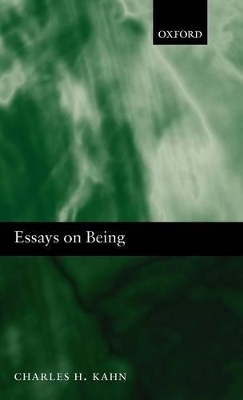
Essays on Being
Seiten
2009
Oxford University Press (Verlag)
978-0-19-953480-7 (ISBN)
Oxford University Press (Verlag)
978-0-19-953480-7 (ISBN)
In this series of essays published over forty years Charles Kahn explicates the ancient Greek concept of Being. His linguistic aim of explaining the meaning of the verb einai is intertwined with his historical and philosophical project of understanding how the concept came to be central to Greek philosophy from Parmenides to Aristotle.
This volume presents a series of essays published by Charles Kahn over a period of forty years, in which he seeks to explicate the ancient Greek concept of Being. He addresses two distinct but intimately related problems, one linguistic and one historical and philosophical. The linguistic problem concerns the theory of the Greek verb einai, 'to be': how to replace the conventional but misleading distinction between copula and existential verb with a more adequate theoretical account. The philosophical problem is in principle quite distinct: to understand how the concept of Being became the central topic in Greek philosophy from Parmenides to Aristotle. But these two problems converge on what Kahn calls the veridical use of einai. In the earlier papers he takes that connection between the verb and the concept of truth to be the key to the central role of Being in Greek philosophy. In the later papers he interprets the veridical in terms of a more general semantic function of the verb, which comprises the notions of existence and instantiation as well as truth.
This volume presents a series of essays published by Charles Kahn over a period of forty years, in which he seeks to explicate the ancient Greek concept of Being. He addresses two distinct but intimately related problems, one linguistic and one historical and philosophical. The linguistic problem concerns the theory of the Greek verb einai, 'to be': how to replace the conventional but misleading distinction between copula and existential verb with a more adequate theoretical account. The philosophical problem is in principle quite distinct: to understand how the concept of Being became the central topic in Greek philosophy from Parmenides to Aristotle. But these two problems converge on what Kahn calls the veridical use of einai. In the earlier papers he takes that connection between the verb and the concept of truth to be the key to the central role of Being in Greek philosophy. In the later papers he interprets the veridical in terms of a more general semantic function of the verb, which comprises the notions of existence and instantiation as well as truth.
Charles H. Kahn is Professor of Philosophy at the University of Pennsylvania.
Introduction ; 1. The Greek verb 'to be' and the concept of Being ; 2. The terminology for copula and existence ; 3. Why existence does not emerge as a distinct concept in Greek philosophy ; 4. Some philosophical uses of 'to be' in Plato ; 5. A return to the verb 'to be' and the concept of Being ; 6. The thesis of Parmenides ; 7. Being in Parmenides and Plato ; 8. Parmenides and Plato once more ; Postscript on Parmenides: Parmenides and physics. The direction of the chariot ride in the proem. The epistemic preference for Fire.
| Erscheint lt. Verlag | 19.2.2009 |
|---|---|
| Verlagsort | Oxford |
| Sprache | englisch |
| Maße | 148 x 222 mm |
| Gewicht | 422 g |
| Themenwelt | Geisteswissenschaften ► Philosophie ► Metaphysik / Ontologie |
| Geisteswissenschaften ► Philosophie ► Philosophie Altertum / Antike | |
| Geisteswissenschaften ► Philosophie ► Sprachphilosophie | |
| Geisteswissenschaften ► Sprach- / Literaturwissenschaft ► Anglistik / Amerikanistik | |
| Geisteswissenschaften ► Sprach- / Literaturwissenschaft ► Literaturwissenschaft | |
| ISBN-10 | 0-19-953480-2 / 0199534802 |
| ISBN-13 | 978-0-19-953480-7 / 9780199534807 |
| Zustand | Neuware |
| Informationen gemäß Produktsicherheitsverordnung (GPSR) | |
| Haben Sie eine Frage zum Produkt? |
Mehr entdecken
aus dem Bereich
aus dem Bereich
eine philosophische Reise
Buch | Softcover (2024)
Goldmann (Verlag)
14,00 €


